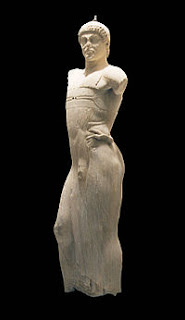[More photos to be added. Slow internet connection.]
This morning we drove up the road a bit to the city of Marsala, at the westernmost point of Sicily. Our main objective was to visit the "salt pans" where salt is extracted from the sea.
Our local guide, Marta, explained that this ancient process has become mechanized in some places, but is still practiced here in the ancient way. The key is a "master" salt-maker, currently a fourth generation craftsman, who is in charge of the entire operation.
The master begins the process at just the right point in the high tide in early spring by opening a gate to allow seawater into the "cold" pool. By observing the feel and the color of the water, the master knows when the sun has evaporated the precise amount of water necessary to raise the salinity of the pool. At that point, the "cold" water is pumped into another pool, above sea level.
Traditionally, the pumps for this process were operated by windmills. Most of the windmills here are still functional, but electric pumps move the water faster. Once raised to the second pool, there are two more pools to follow, each one closer to shore than the one before. Again, the master knows by color and feel the exact point at which to drain the water from one pool to the next.
In the final pool, two types of salt are the final result: The first is a very fine film that forms on the surface on windless mornings. The is the rarest and purest. The other is more common sea salt that settles on the bottom of the pool, about four inches thick. It, too is 99% pure, but is more coarse and crystalline. It is taken to a mill to be ground.
A wind-driven grinding mill is on site, but no longer used. The building holding it is now a museum and shop.
After our tour of the salt pans, we boarded a sort of oversized pontoon boat for a brief trip over to the island called San Pantaleo or Mozia (depending on who you ask), only about 300 meters off shore. In the 8th century B.C.E. this island was connected to the main body of Sicily by a narrow causeway and was the location of a Phoenician trading settlement known as Motia or Mothya.
In the late 1800s, the entire island was purchased by a British businessman named Joseph Whitaker who, along with his brother, had inherited a large Sicilian wine business from their uncle. Joseph married the daughter of a famous Italian general, and enjoyed the success of the wine business by engaging in his passion for, among other hobbies, amateur archaeology.
Whitaker's mansion on the island is now a museum of his many finds related to the Phoenician city that existed in his back yard from the 8th to 5th centuries B.C.E. The collection is a bit haphazard, which underscores the both the amateur nature of his work, as well as the state of archaeological science of the time.
 |
| Borrowed photo |
The most important discovery is a life-sized statue knowns as "The Young Man of Mothya." Though the arms and feet are missing, it is in remarkably good shape.
A picnic-style lunch was served to us on the patio of the Whitaker mansion. It was typical Sicilian fare, with bread, olives, egg plant, tomatoes, couscous, and fruit. The food and wine were excellent. After the meal, we enjoyed a walk around the small island, visiting some of the archaeological dig sites, as well as Whitaker's vineyards and olive groves.
In the distance, across the bay, we could see dozens and dozens of paragliding or parasurfing sails. There may have been a hundred! No one in our group had ever seen so many in one place.
After the boat returned us to shore, we got back to the bus for the trip back to Mazara del Vallo. About half the group opted to be dropped, with Flaminia, at a local Catholic church hall to meet with a group of Tunisian immigrant women. I turned out to be the only man in a group of 20 or so women. Unfortunately, the Sicilian woman who runs the program so completely dominated the conversation that we heard almost nothing from the Tunisian women.
After a brief respite back at the hotel, we walked to a local restaurant for a cooking class and meal. They mostly served us what we had made in the kitchen, under the chef's direction. It was a pretty good meal, despite our involvement.








No comments:
Post a Comment